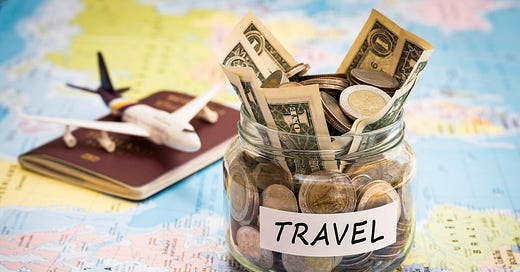If you're a regular on my substack, you know I'm not here for the penny-pinchers. My philosophy on traveling and living abroad? It's simple - aim for a higher quality of life. Why move to a country with a lower cost of living just to live like the average Joe? Some may brand it as "elitist," but hey, it is what it is.
That said, I'm not advocating for overpaying or doing things inefficiently. The tips I'm about to drop not only slash costs efficiently but also double up as safety measures. Let's dive into a world of unapologetic luxury and practicality.
Stay away from tourist traps
DO NOT stay in tourist traps! You won’t get to know the culture, you will be overcharged for hotels, food, and all other services, and you will essentially visit the same place over and over again and if the tourist area is popular, you’re going to deal with other tourist.
I have traveled the world and while it’s ok to spend a couple of days in tourist areas, it’s usually not a good choice to spend much time. You will spend tons more money in these places and you won’t get to know anything about the place you are staying.
Meeting Chicks could often be harder in these areas because seeing foreigners will be so common that you don’t stand out. Coincidentally, it could often be easier, because these are where the chicks go when they are looking for foreigners. Again… based on my writing… These typically aren’t the girls you should be going after anyway.
Pro Tip: When you’re looking for a place to stay in Latin America…. Don’t stay in the Centros. Centro is often the older part of the city, often grimey and more dangerous. Do some research ahead of time and find out the best part of the city. For instance, Mexico City's Centro can be 30 minutes from the bulk of nightlife, and 40 minutes from Polanco, which is the Beverly Hills part of town.
Get a travel credit card or debit card
If you don’t have a credit card tailored to travel, you are literally throwing away money. These credit card companies offer incentives that give you a good percentage of money back on travel purchases, airline miles, and signup bonuses where you get essentially $400 given to you after you spend your first $1000 to $3000.
Then, your current credit card most likely has foreign transaction fees. These are usually around 4%. That will add up very quickly, so make sure to get a card that has no foreign transaction fees. I even wrote a Shill Post for my favorite credit card. The sign-up bonus is 60k points or $900 on the Chase portal.
Find a Debit Card with no international fees
I pay no ATM fees, and my debit card is accepted nearly anywhere in the world. If you’re a veteran, you could use USAA. If you aren't, I have heard that Schwab has no international fees. This has saved me thousands over the years in ATM fees and is very reliable. Typically, I take out a couple of hundred dollars at a time, hopefully when the exchange rate is in my favor, and leave the bulk of cash at home, only carrying what I need.
Research flights ahead of time on the right websites
Theres a million website you can use to search for flights. I personally enjoy skyscanner, google flights and Skiplagged. This should be obvious information, but its clearly not based on the amount of people messaging me to book last minute flights.
Book Ahead.* If you live in Mexico or certain Latin American countries, you travel often and are flexible. Search the common airline and see if they have deals directly through their websites. For instance - Mexican Airline has a Volaris pass that also serves international flights. I bought one last summer and abused the hell out of it. I’ll be surprised if they let me renew is. Essentially I can hop on any flight last minute and pay about $25 dollars in taxes and nothing else.
Eating out vs Cooking - Long Term VS Short Term
If you're planning to post up and live somewhere more long-term, learn to cook. It's almost always going to be easier to get groceries and cook. Assuming you are some sort of remote worker, you're likely going to be in your house for periods of time.
I buy bulk ingredients and meal prep a bunch of meals so I can eat throughout the day while working remote. I simply hate getting under and having to wait for food to come in Latin America.
Inversely - Many LATAM countries have the app Rappi. If you don't know it, get it. It's UberEats on steroids; you can order groceries, from pharmacies, literally everything, and it's a fourth of the price as order apps in the West. Sometimes it's actually cheaper to order food on the app than try to cook it yourself.
If you're in a location short term - This is where I say, eat out. Go outside and hit up the local vendors; street food is cheap. If you're not right on top of the tourist areas, restaurants are also cheap. The cost savings are so negligible that you might as well eat out and enjoy the local cuisine vs penny pinch and try to cook in your Airbnb for a couple of days. Plus, inevitably you are going to buy food to cook and still go out to eat.
At most, I would buy some snacks and a case of water for a short term trip.
The cheapest monthly rentals are found on foot
Forget the online rabbit hole when it comes to finding the best monthly rentals; the real treasures are discovered by pounding the pavement. Take to the streets of your desired neighborhood, strike up conversations, and keep an eye out for signs—this is where the magic happens.
Surprisingly, university areas often cater to the needs of many travelers. Why? Because students seek furnished apartments. In contrast, numerous neighborhoods in cities offer unfurnished options, and in some cases, even lack basic appliances like fridges. University areas not only present budget-friendly options but also offer the chance to connect with more people.
Even if you manage to snag a $400 to $500 monthly rental online, there's a hidden world waiting for you. Landlords less inclined towards the internet can be your ticket to the best deals on the finest apartments. The internet-savvy landlords, on the other hand, often exploit the ignorance of clueless travelers, charging them a premium.
To dive deeper into the art of finding housing, especially in Mexico but applicable across Latin America, check out my comprehensive article on the subject. Uncover the insider tips and local strategies that will not only save you money but also lead you to the hidden gems that don't make it to the online listings.
Stay in one spot for at least a month
If you're looking to break free from the short-term traveler mold, it's time to reconsider the rapid bouncing from one place to another. This whirlwind approach not only ends up costing you more money but also denies you the opportunity to truly immerse yourself in a city long enough to determine if it could be your ideal home base.
The key? Embrace the art of staying put.
Try to anchor yourself in a location for at least a month and secure a monthly rental. These accommodations typically come at a fraction of the cost, ranging from one-third to half of what you might pay for a hotel each month. Ditch the transient lifestyle and seek out the richness that comes with a more prolonged stay.
Finding a monthly rental has never been easier. Utilize online platforms to search for "furnished apartments in X city" or explore options on Airbnb.com, where you can secure apartments for days, weeks, or even months. By extending your stay, you not only cut down on costs but also gain a comprehensive and authentic understanding of the city—a crucial step in deciding on the perfect home base. So, slow down, unpack your bags, and let the city reveal its true colors.
Take buses Vs flights
Admittedly, this part was a challenge for me to write. I'm typically inclined to skip ground transportation and opt for the quickest route, especially with a flight pass in hand. Unlike the U.S., but surprisingly akin to Europe, buses and trains in Latin America have proven to be exceptional.
In Mexico, where intercity bus systems are privatized, the rides are not only smooth but also offer a chance to soak in the local scenery. While it might add a bit to your travel time, the money saved and the unique sights witnessed make it a worthwhile trade-off.
Moreover, even in some of the larger Latin American cities, reliable and affordable airlines might be in short supply. So, embracing buses and trains not only becomes a cost-effective alternative but also an opportunity to experience the journey in a way that flying simply can't provide. Sometimes, taking the scenic route is more than just a choice; it's an adventure waiting to unfold.
Price haggle strategy
As a firm advocate against falling victim to "gringo prices," mastering the art of haggling and negotiation becomes essential. In many "third-world" countries, markets are rife with attempts to charge foreigners up to three times more than locals. Here are a few savvy strategies to navigate these situations:
Laugh Off the Initial Offer: When presented with an exorbitant price, react with a bemused laugh. Counter with a price that is one-third of their original offer. Expect a round of haggling, and settle for a price that's around half of their initial demand. This way, both parties feel they've had a fair negotiation.
Master the Art of Walking Away: Don't hesitate to feign walking away if an agreement isn't reached. More often than not, vendors will call you back with a final, more reasonable offer. I've snagged deals using this strategy over 50 times.
Bill-Sized Pocket Strategy: A humorous yet effective tactic involves segregating different bill denominations into different pockets. For instance, $5 bills in the right pocket, $10 bills in the left, and loose change in the back pocket. Keep your actual wallet with larger bills secure in your jacket. When faced with an inflated price, pretend to dig into your pockets, producing smaller bills and claiming it's all you have. The vendor may relent and offer a more reasonable price.
Language as a Bargaining Tool: Taking language lessons, especially in Spanish, can significantly reduce the likelihood of being overcharged. Even basic language skills empower you to navigate negotiations more effectively and avoid unnecessary expenses.
Don’t take the “Try Hard” taxis
When it comes to taxis, here's a golden rule: steer clear of the "try-hards." These are the drivers exerting extra effort to lure unsuspecting passengers who are willing to overpay. Be savvy and opt for a taxi that isn't aggressively vying for customers; these drivers are less likely to be seasoned rip-off artists.
If there's a taxi stand, make your way to the last driver – the one who likely got overlooked by the hustlers at the front. For an added layer of security, consider avoiding taxis unless absolutely necessary. In most places I've visited, Uber has become a reliable alternative. In Mexican cities without Uber, an app called DIDI is often available. Be proactive in researching alternatives ahead of time, though, as some cities may have taxi gangs monopolizing the market, forcing out rideshare apps and compelling people to use traditional taxis. One such example is the Riviera Maya, encompassing destinations like Cancun, Tulum, and Playa del Carmen.
Cancel all continuous bills before leaving for a long trip
When embarking on a long trip, lighten your financial baggage by eliminating ongoing payments. Here are two strategies to consider:
Sell Unnecessary Belongings: Let go of anything that doesn't contribute to your happiness. Whether it's an apartment, furniture, or an unwanted car, use platforms like Craigslist to sell them. In the modern era, you can even sell items that are still under payment. By doing this, not only will you achieve mental freedom, but you'll also secure financial independence.
Optimize Continuous Payments: For those, like me, who need to maintain some business ties back home, consider optimizing continuous payments. If occasional returns for business are part of your plan, streamline your financial commitments to the most economical options. This may involve choosing the cheapest insurance for your car and properties, as well as opting for budget-friendly storage solutions for your furniture. This way, you can manage your business affairs efficiently while enjoying the freedom of an extended journey.
Use local packages on cell phones and use a common provider
When traveling to a new country, having a local phone number is essential. Most people won't have iPhones for iMessage, so you end up resorting to WhatsApp. However, many US companies offer extremely expensive cell phone plans for international data. It's baffling, but I've encountered many people tied to their local home country numbers, paying $60-70 a month to maintain them.
There are always a few companies to choose from when selecting a prepaid SIM card. Here's my strategy for getting the best deal:
Ask About Common Usage: Inquire about what most people use; calls and texts are usually more affordable within the same company. Avoid asking about the "best" company, as it often leads to overpaying for features like ridiculously fast internet.
Explore Packet Options: In many less affluent countries, you can significantly reduce your cell phone plan cost by buying text or calling packets. Ensure your phone has a SIM slot, as newer phones may rely on eSIMs, which can be challenging to switch in Latin America due to their rarity and the requirement of a contract plan. Pro tip: Port your number to Google Voice for $10, allowing you to retain your number and use it for two-factor authentication.
Consider Long-Term Options: If you'll be out of the country for an extended period, porting your number to Google Voice is a smart move instead of keeping a traditional phone plan. Note that this doesn't refer to "Google Fi," a separate phone plan through Google that may cancel if you're abroad for too long. Porting your number to Google Voice and acquiring a local number on the ground is a practical solution for day-to-day use.
Submit your Questions, Feedback, Requests and Recommendations Below
Feedback Form









